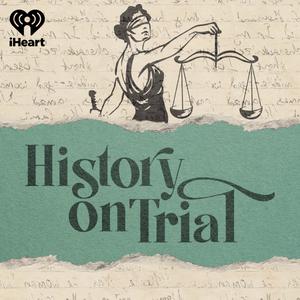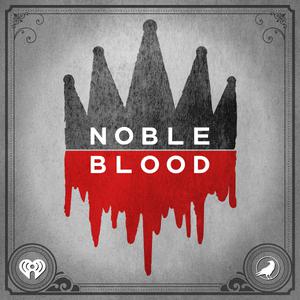
History on Trial
iHeartPodcasts
From the Salem Witch Trials to O.J. Simpson, trials have always revealed hidden truths about our world. History on Trial digs into famous legal battles from American history, uncovering the real story behind the headlines, and exploring the powerful cultural contexts that shaped the verdicts -- and still impact us today. Fans of true crime, legal dramas, and history alike will be captivated by the unbelievable cases that played out in the courtrooms of history. Hosted by Mira Hayward. New episodes drop every other Thursday.
- 44 minutes 24 secondsCharity's Crime
In 1854, a gruesome murder rocked the Oregon Territory. Charity Lamb stood accused of killing her husband, Nathaniel, with an axe. Newspapers called Charity a monster and speculated on her marriage. But there was more to the story. Would Nathaniel's history of physically abusing Charity convince jurors that she had acted in self-defense?
See omnystudio.com/listener for privacy information.
2 January 2025, 8:00 am - 59 minutes 28 secondsHorror in Honolulu: Part Two
It's 1932, and Thalia Massie's husband, Tommie, and mother, Grace, are getting frustrated with what they see as the failings of the Hawaiian justice system. Soon they decide to take matters into their own hands. When events take a deadly turn, will Tommie and Grace's connections help them evade punishment? Or will Hawai‘i itself suffer the consequences of these visitors' actions?
See omnystudio.com/listener for privacy information.
12 December 2024, 8:00 am - 53 minutes 8 secondsHorror in Honolulu: Part One
In 1931, Thalia Massie, a white woman, told Honolulu police that she had been raped by a group of Hawaiian men. Police quickly zeroed in on five young men who'd been involved in a fight earlier that night. But there was a problem: the suspects had ironclad alibis. In the face of a political establishment determined to get convictions for Thalia Massie’s rape, would the truth be a good enough defense?
See omnystudio.com/listener for privacy information.
5 December 2024, 8:00 am - 57 minutes 47 secondsTrial at the O.K. Corral
In 1881, the Earp brothers and Doc Holliday faced the Clantons and the McLaurys in the Old West's most famous showdown: the gunfight at the O.K. Corral. When the smoke cleared, three men lay dead. Some called it Western justice. But would Western justice suffice as a defense when one of the survivors took the Earps and Holliday to trial for murder?
See omnystudio.com/listener for privacy information.
21 November 2024, 8:01 am - 55 minutes 18 secondsThe Poison Precedent: Part Two
It's 1900, and Roland Molineux's murder trial is coming to a close. The prosecution has used some unorthodox methods to prove their case. Will their tactics secure them a conviction? Or will the defense manage to argue their way out? What happens next will create a precedent that still matters today.
See omnystudio.com/listener for privacy information.
31 October 2024, 7:01 am - 55 minutes 52 secondsThe Poison Precedent: Part One
In 1898, two fatal poisonings horrified New Yorkers. When it emerged that both victims were connected to one person, a wealthy young chemist named Roland Molineux, the police thought they had their man. But proving their suspicions was easier said than done, and convicting Molineux would require creativity on the part of the police and the district attorney. Would their legal tricks succeed...or get their case thrown out?
See omnystudio.com/listener for privacy information.
24 October 2024, 7:01 am - 48 minutes 56 secondsThe Real Lincoln Lawyer
In 1859, Abraham Lincoln walked into a courtroom in Springfield, Illinois, ready to defend his client. No one knew it then, but this would be Lincoln's last murder trial; fourteen months later, he would be elected president. Lincoln's defense of 22-year-old Quinn Harrison, accused of killing another young man in a fight, highlights the future president's brilliance. But would Lincoln's legal skills be enough to free Quinn Harrison?
See omnystudio.com/listener for privacy information.
10 October 2024, 7:01 am - 45 minutes 27 secondsMurder in Plymouth
In 1638, four English indentured servants attacked and robbed Penowanyanquis, a member of the Nipmuc tribe. Once the killers were caught, colonial authorities decided to put the men on trial. The case seemed clear enough. But with tensions rising between colonists and indigenous peoples, not to mention a makeshift court system, could the Plymouth colonists find a path to justice and prevent further violence?
See omnystudio.com/listener for privacy information.
26 September 2024, 7:01 am - 54 minutes 31 secondsThe Questionable Confession
In 1919, the murder of three Chinese diplomats stunned Washington, D.C. When a young Chinese man, Ziang Sung Wan, confessed to the crime, it seemed like an open and shut case. But at the trial, Wan's lawyers would claim that police had coerced Wan into confessing. What happened next would change the nature of police work and the rights of suspects, forever.
See omnystudio.com/listener for privacy information.
12 September 2024, 7:01 am - 57 minutes 37 secondsThe American Plan
In 1918, teenager Nina McCall was detained, forcibly examined for an STI, and then imprisoned in a hospital for three months. Nina's story is horrifying, but it is not unique: throughout the 20th century, thousands of women endured similar ordeals, all thanks to an STI prevention program known as "The American Plan." Like many other women, Nina fought back, suing the officials responsible for her treatment. Could her lawsuit stop the Plan -- or at least get her justice?
See omnystudio.com/listener for privacy information.
29 August 2024, 7:01 am - 1 hour 6 minutesMutiny on the Somers
In 1842, three Navy men plotted to seize control of the USS Somers and turn it into a pirate ship. When the Somers' captain, Commander Alexander Slidell Mackenzie, learned of the plot, he had the three men executed. But when the Somers arrived back in America, questions started to emerge. Were the executions justified? Was the mutiny plot even real? These questions would be explored at the commander's 1843 court-martial.
See omnystudio.com/listener for privacy information.
15 August 2024, 11:37 am - More Episodes? Get the App
Your feedback is valuable to us. Should you encounter any bugs, glitches, lack of functionality or other problems, please email us on [email protected] or join Moon.FM Telegram Group where you can talk directly to the dev team who are happy to answer any queries.
 Noble Blood
Noble Blood
 Plodding Through The Presidents
Plodding Through The Presidents
 Criminalia
Criminalia
 Grim & Mild Presents
Grim & Mild Presents
 Very Special Episodes
Very Special Episodes
 Stuff You Missed in History Class
Stuff You Missed in History Class